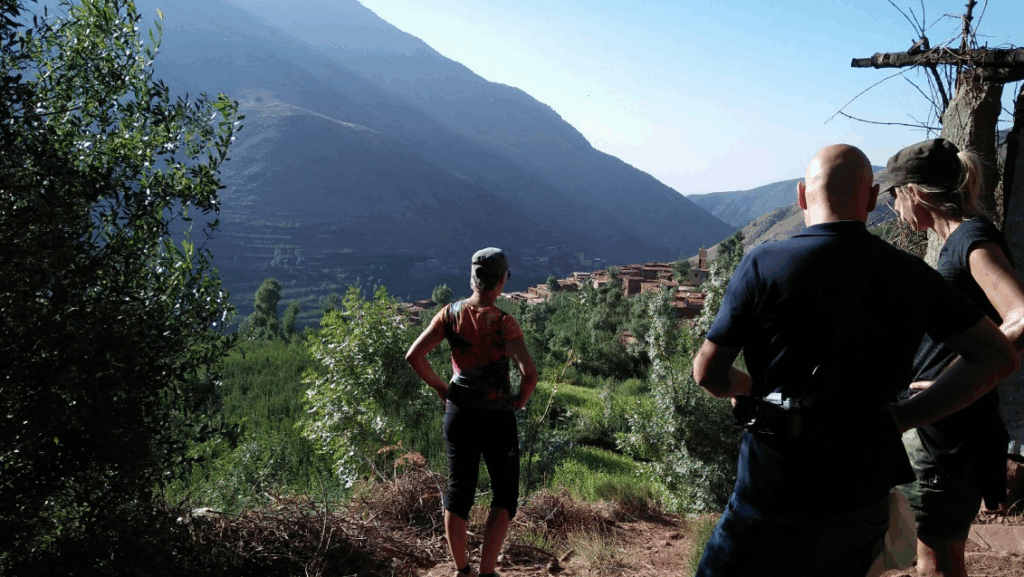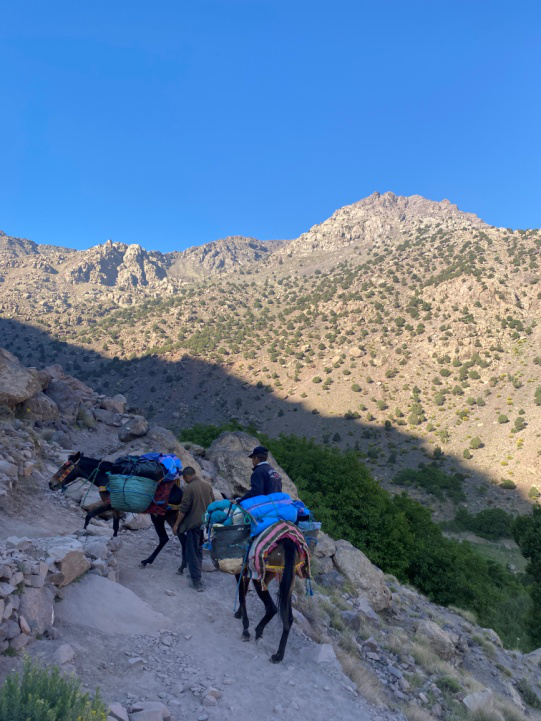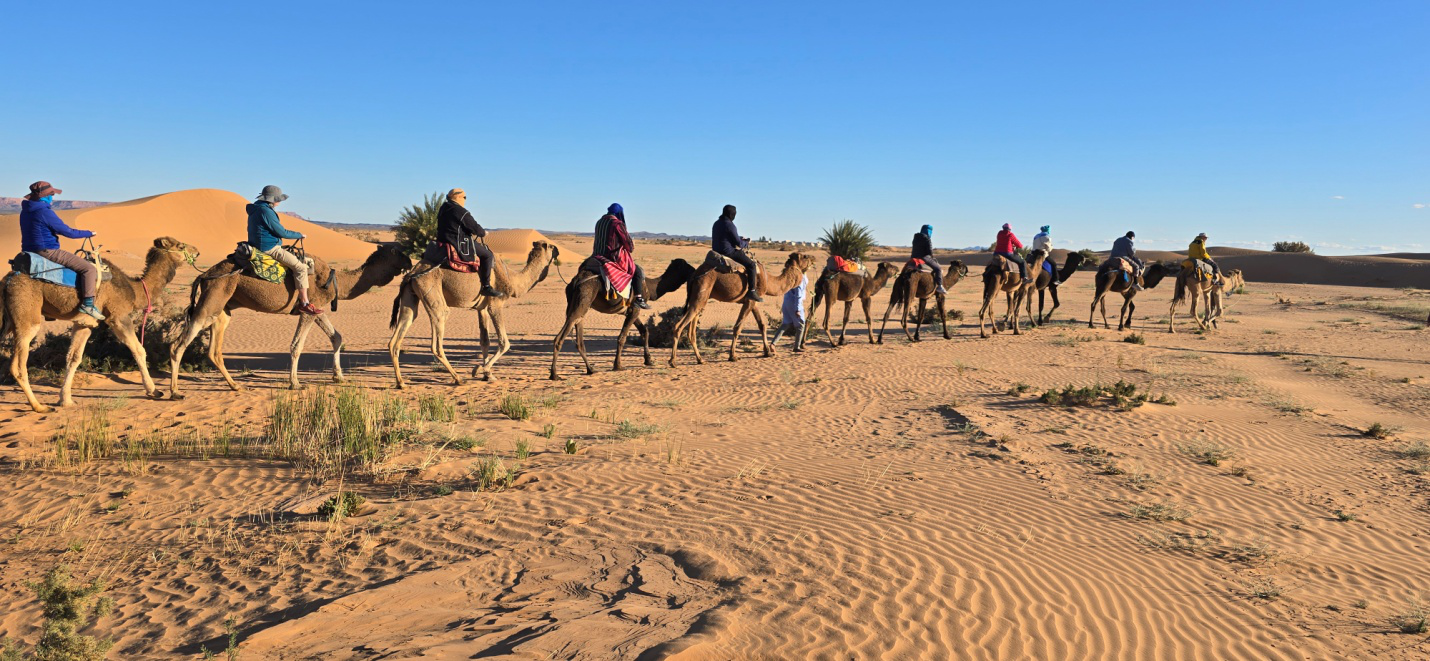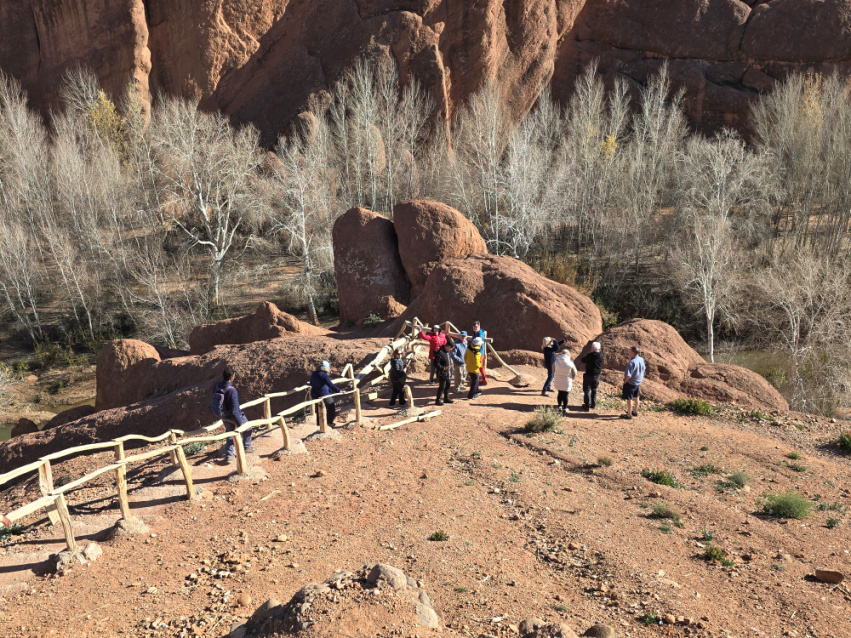Ever wondered what it would feel like to swap your 9-to-5 for mountain sunrises and Berber hospitality? Think “Eat, Pray, Love,” but with hiking boots.
For many of us, the idea of trekking in the Atlas Mountains sounds like something out of an adventure film. However, once you’re there, boots on, pack tightened, the call to prayer echoing through the valleys, it feels real in the best possible way. If this is your first time trekking, especially in Morocco, here’s everything you need to know before setting foot on those ancient trails.
What Trekking in the Atlas Mountains Really Looks Like
Forget paved trails and snack bars. When you trek in the Atlas Mountains, you’re walking through centuries of history, guided by locals who know every rock and ridge by heart. The terrain changes fast from rocky ridges and green valleys to snowy slopes if you’re aiming for Mount Toubkal.
You’ll hike between 4–8 hours a day, depending on your route, with breaks for tea (always sweet, always hot) and meals in guesthouses or mountain lodges. Nights are quiet and star-filled, especially at higher altitudes where phones lose signal and your thoughts finally slow down.
Also Read: Trekking the Atlas Mountains: Weather, Wildlife, and Wonders
First-Time Trekking? Here’s the Mindset That Helps
This isn’t about being the fittest person on the trail. It’s about being ready to keep going when your legs are tired and the summit still feels far. Mental stamina is just as important as physical.
Pack light. Breathe deep. Laugh when your socks get wet. It’s not a race, it’s a test of patience, humility, and presence.
Pro Tip: Don’t overpack. Your guide and mules will thank you. Bring quality layers, good boots, sunscreen, and a water filter—you’ll use all of them.
What About Food and Water on the Trail?
One of the biggest surprises for first-time trekking in the Atlas Mountains is how well-fed you’ll be even at high altitude. Local guides often travel with skilled cooks who prepare fresh, hearty Moroccan meals like tagines, couscous, and lentil soup. Meals are typically served picnic-style during breaks or around a campfire at night, depending on your route.
As for water, don’t count on streams or village taps. It’s essential to bring a reusable bottle and water purification tablets or a filter system. Most Morocco guided tours include purified water or help you access it safely. Staying hydrated is key, especially if you’re hiking under the sun or adjusting to elevation.
Pro Tip: Start hydrating days before your trek. Acclimating to altitude isn’t just about hiking slowly, it’s about giving your body what it needs to adjust well.
What to Pack for Atlas Mountain Hiking Tours
Essentials:
- Broken-in hiking boots
- Layers (base, mid, waterproof shell)
- Hat and gloves (it gets cold, even in summer, at altitude)
- Headlamp (some mornings start before sunrise)
- Personal meds and a small first aid kit
- Refillable water bottle and purification tabs
Optional but awesome: trekking poles, a lightweight sleeping bag (some treks provide bedding), and wet wipes.
Did You Know? Mount Toubkal is the highest peak in North Africa, sitting at 4,167 meters (13,671 feet). That’s higher than Japan’s Mt. Fuji!
What the Trails Are Actually Like
There’s no single way to trek in the Atlas Mountains. Some trails take you through remote Berber villages, where life moves to the rhythm of the land. Others push you up steep passes where the wind bites and views stretch forever.
For first-timers, popular multi-day routes like the Mount Toubkal trek or hikes through the Azzaden or Imlil valleys strike a good balance of challenge and cultural depth. These aren’t just hikes, they’re a window into Morocco that most tourists never see.
Why Morocco Guided Tours Make All the Difference
Sure, you could try to do this on your own. But having local guides, especially with a group like Omar Adventures, means more than just trail knowledge. They offer cultural insight, language support, safe pacing, and real connection.
It’s not about being “taken care of”; it’s about sharing the trail with people who live it daily, and for first-time trekking in Morocco, that makes the difference between a stressful hike and a life-changing one.
Safety Tips and Trail Etiquette
- Altitude:Acclimatize slowly if you’re going above 3,000 meters. Hydrate and rest when needed.
- Respect:Always ask before photographing people. Modest clothing goes a long way in showing cultural respect.
- Leave No Trace:Pack it in, pack it out, even biodegradable items. These trails deserve our care.
Choosing the Right Trek
If you’re looking for something short and rewarding, 2-3 day treks from Imlil into the surrounding valleys are perfect. Want more? Go for a 5–7 day loop that includes the Toubkal summit. These Atlas Mountains hiking tours are customizable, but they always require prep and good company.
Luxury or Rugged? Why Not Both?
Here’s the kicker: you don’t have to “rough it” to experience the mountains. Morocco guided tours often combine trekking with rest days in cozy mountain lodges or even luxury riads in Marrakech post-hike. That mix of dirt trail by day and hot showers by night is what makes this type of trip sustainable and special.
Ready to Lace Up? Go Beyond the Map—Trek With Heart
We believe first-time trekking in Morocco should feel personal, rewarding, and unforgettable. With Omar Adventures, you get more than a guide—you get a team that walks beside you with purpose, passion, and local pride.
Whether you’re summiting Toubkal or walking valley trails, we’ll make sure your trek in the Atlas Mountains feels as real and raw as it should, with the right support, pacing, and smiles along the way.
Let’s hit the trail together.
Contact Omar Adventures today to start planning your trek in the Atlas Mountains.






